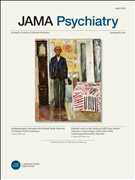JAMA Psychiatry:DSM-IV中关于重性抑郁诊断标准的多个遗传因素证据
2013-04-25 文馨 编译 医学论坛网
重性抑郁症(MD)的临床诊断标准反映遗传风险的单个还是多个维度尚不清楚。一项最新研究表明,MD的DSM-IV综合征不是反映遗传易感性的单个维度。相反,这些标准反映了指示认知/精神、情绪和植物神经系统症状遗传风险的3个潜在维度。这些结果经采用评估的遗传因素评分预测验证,当需要重复时,对MD的遗传研究会有所启示。相关论文于2013年4月17日在线发表于《美国医学会杂志·精神病学》(JAMA&nbs
重性抑郁症(MD)的临床诊断标准反映遗传风险的单个还是多个维度尚不清楚。一项最新研究表明,MD的DSM-IV综合征不是反映遗传易感性的单个维度。相反,这些标准反映了指示认知/精神、情绪和植物神经系统症状遗传风险的3个潜在维度。这些结果经采用评估的遗传因素评分预测验证,当需要重复时,对MD的遗传研究会有所启示。相关论文于2013年4月17日在线发表于《美国医学会杂志·精神病学》(JAMA Psychiatry)上。
该项基于人群的研究旨在确定9项精神疾病诊断与统计手册-IV(DSM-IV)中关于症状性MD的诊断标准的遗传与环境危险因素的结构。
研究纳入了7500名来自弗吉尼亚成人双胞胎的精神病和物质所致精神障碍研究的成年双胞胎对。主要转归指标为从个人访谈中评估的终生MD症状。
结果显示,最佳拟合的双胞胎模型是多维度的,需要3个遗传的,1个公共环境的和3个独特环境的公共因素,和标准特异性独特环境因素。第一个遗传因素的特征是高负荷的认知和精神抑郁症状。第二个和第三个遗传因素分别具有较强负荷的情绪和植物神经系统抑郁症状。从这3个因素中衍生出的遗传因素评分有区别地预测了共病模式,MD的其他病史/临床特征,和人口统计变量。这些结果表明,第一个遗传因素反映了对压抑性障碍的一种总体易感性,而第三个遗传因素则对忧郁性MD更特异。这3个独特的环境共同因素分别反应了总体抑郁、核心情绪和认知抑郁症状。
与抑郁相关的拓展阅读:
- Eur J Prev Cardiol:生活方式干预延缓抑郁症状进展
- J Med Life:1型糖尿病合并抑郁者转归较差
- Am J Psychiatry:老年抑郁症转归的调节因素
- ADAA:应用氯胺酮抗抑郁 时机尚不成熟
- ADAA:抗抑郁药联合认知行为疗法对老年焦虑效果好 更多信息请点击:有关抑郁更多资讯

Evidence for Multiple Genetic Factors Underlying DSM-IV Criteria for Major Depression
Importance
We do not know whether the clinical criteria for major depression (MD) reflect a single or multiple dimensions of genetic risk.
Objective
To determine the structure of genetic and environmental risk factors for the 9 DSM-IV symptomatic MD criteria.
Design
Population-based twin registry.
Setting
Virginia.
Participants
Seven thousand five hundred members of adult twin pairs from the Virginia Adult Twin Study of Psychiatric and Substance Use Disorders.
Main Outcome Measure
Symptoms of lifetime MD as assessed at personal interview.
Results
The best-fit twin model was multidimensional, requiring 3 genetic, 1 common environmental and 3 unique environmental common factors, and criterion-specific unique environmental factors. The first genetic factor was characterized by high loadings on cognitive and psychomotor depressive symptoms. The second and third genetic factors had strong loadings for mood and neurovegetative depressive symptoms, respectively. Genetic factor scores derived from these 3 factors differentially predicted patterns of comorbidity, other historical/clinical features of MD, and demographic variables. These results suggested that the first genetic factor reflected a general liability to internalizing disorders, while the third genetic factor was more specific for melancholic MD. The 3 unique environmental common factors reflected, respectively, global depressive, core mood, and cognitive depressive symptoms.
Conclusions and Relevance
The DSM-IV syndrome of MD does not reflect a single dimension of genetic liability. Rather, these criteria reflect 3 underlying dimensions that index genetic risk for cognitive/psychomotor, mood, and neurovegetative symptoms. While in need of replication, these results, validated by predictions using estimated genetic factor scores, have implications for gene-finding efforts for MD.
作者:文馨 编译
版权声明:
本网站所有注明“来源:梅斯医学”或“来源:MedSci原创”的文字、图片和音视频资料,版权均属于梅斯医学所有。非经授权,任何媒体、网站或个人不得转载,授权转载时须注明“来源:梅斯医学”。其它来源的文章系转载文章,本网所有转载文章系出于传递更多信息之目的,转载内容不代表本站立场。不希望被转载的媒体或个人可与我们联系,我们将立即进行删除处理。
在此留言





#Psychiatry#
62
#诊断标准#
70
#遗传因素#
68